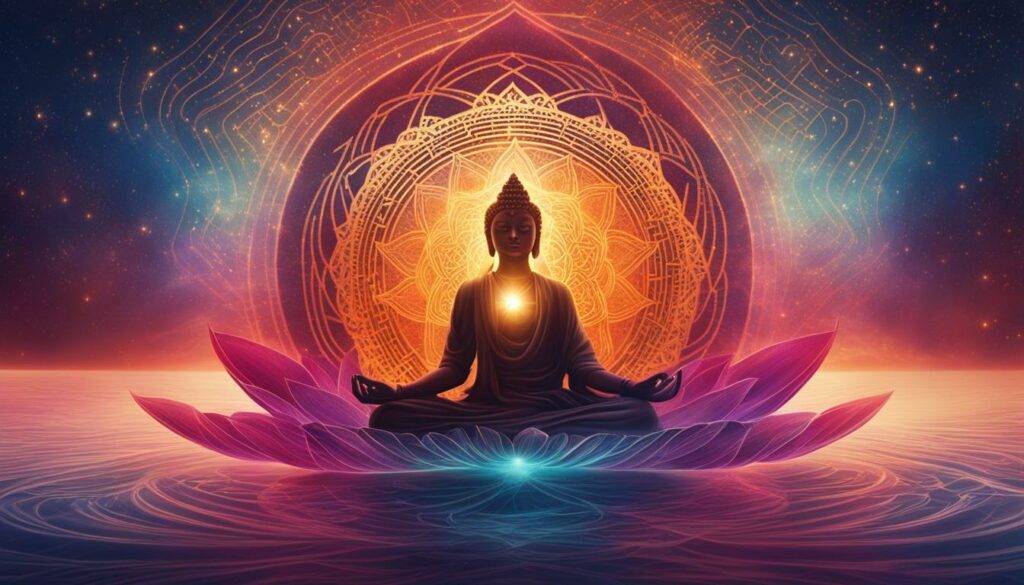Welcome to a transformative journey towards inner peace and spiritual growth. In the realm of meditation, two powerful practices stand out: chanting and prayer meditation.
By incorporating these mindfulness techniques into your daily routine, you can unlock deep relaxation, refine your spiritual practices, and find healing through meditation.
Chanting and prayer meditation have been revered for centuries as gateways to tranquility.
Through the repetition of mantras and meditative prayers, you can access profound states of stillness and connect with a higher consciousness. These practices hold the key to soothing your mind, rejuvenating your spirit, and finding respite from the stresses of everyday life.
Key Takeaways:
- Chanting and prayer meditation offer a path to spiritual growth and tranquility.
- Mantras and meditative prayers are powerful tools with deep spiritual symbolism.
- By incorporating these practices into your routine, you can experience deep relaxation and healing.
- Mindfulness meditation and mantra meditation enhance focus, concentration, and stress relief.
- Exploring the world of chanting and prayer meditation can lead to profound peace and spiritual awakening.
The Concept of Mantras in Meditation
Mantras are not just words or phrases; they carry powerful energy that resonates with your inner being. These sacred sounds or phrases have a deep spiritual symbolism that enables you to connect with your consciousness and unlock profound states of tranquility.
Mantras can be in any language, but they are often in Sanskrit. They originated from the ancient spiritual traditions of the East, particularly Hinduism, Buddhism, and Jainism, and have since been embraced by various global spiritual practices.
The Significance of Mantras
Mantras hold a profound significance in meditation as they create vibrations and energy that align with your intentions and aspirations. Each mantra carries its own unique essence and resonates with different individuals.
They are regarded as expressions of truth and serve as a way to connect with divine forces. Mantras are associated with specific deities in different traditions, representing different qualities and aspects of consciousness.
Through the repetition of mantras, you can tap into their transformative power, deepen your focus, and experience profound relaxation and spiritual growth.
Unlocking the Spiritual Symbolism
The spiritual symbolism of mantras lies in their sounds and vibrations. The ancient sages believed that different sounds correspond to specific energy centers within the body, known as chakras.
When you chant or repeat a mantra, the sound resonates throughout your entire being, aligning and harmonizing these energy centers, creating a profound sense of balance and peace.
The rhythmic repetition of mantras helps quiet the mind, release negative thoughts and emotions, and allows you to access deeper states of consciousness.
“Just as a musical note resonates and creates a vibration in the air, a mantra resonates and creates a vibration within you.”
The vibrational energy of mantras serves as a powerful tool for self-transformation. It enables you to transcend the limitations of the mind and connect with your true essence.
By incorporating mantras into your meditation practice, you can enhance your focus and concentration, promote relaxation and stress relief, and deepen your spiritual connection.
Mantras are a gateway to unlocking the transformative power of your own consciousness and experiencing states of profound peace, clarity, and spiritual awakening.
Mantras in Meditation: Key Points
| Key Point | Description |
|---|---|
| 1. Energy and Vibrations | Mantras carry powerful energy and vibrations that resonate with your inner being, promoting deep states of tranquility. |
| 2. Spiritual Symbolism | Mantras have deep spiritual symbolism in their sounds and vibrations, aligning and harmonizing your energy centers. |
| 3. Focus and Concentration | Chanting mantras enhances focus and concentration, bringing your attention back to the present moment. |
| 4. Relaxation and Stress Relief | The rhythmic repetition of mantras induces a state of calmness, helping quiet the mind and release negative thoughts and emotions. |
| 5. Spiritual Connection | Mantras serve as a powerful tool for spiritual connection, allowing you to tap into your true essence and experience deep inner peace. |

The Role of Mantras in Meditation
Mantras play a crucial role in meditation by enhancing focus and concentration, promoting relaxation and stress relief, and deepening the mind-body connection.
When you incorporate mantras into your meditation practice, they act as vehicles that carry your awareness from the active, surface level of the mind to the deeper realms of consciousness.
Chanting a mantra improves your concentration levels and enhances your focus, especially in the early stages of your meditation practice. As you repeat the mantra, it becomes a rhythm that guides your breath and induces a state of calmness.
This rhythmic pattern helps quiet the mind and release negative thoughts and emotions, resulting in a sense of relief and rejuvenation.
The repetition of mantras strengthens the mind-body connection, allowing you to experience profound peace, clarity, and spiritual awakening. As you chant the mantra, you create harmonious vibrations within yourself, aligning your energy with the essence of the mantra.
This alignment deepens your meditation experience, helping you connect with your inner self and the universal consciousness.
The Role of Mantras in Meditation:
- Enhancing focus and concentration
- Promoting relaxation and stress relief
- Deepening the mind-body connection

“The repetition of mantras strengthens the mind-body connection, allowing you to experience profound peace, clarity, and spiritual awakening.”
How to Use Mantras in Meditation
Using mantras in meditation is a powerful tool to deepen your practice and achieve a state of profound peace and clarity. By incorporating mantras into your meditation routine, you can enhance focus, concentration, and relaxation.
But how exactly do you use mantras in meditation? Let’s explore the steps.
Choosing the Right Mantra
The first step in using mantras in meditation is selecting the right mantra that resonates with your true self and intentions. A mantra should calm and inspire you, leading you into deeper meditative states.
You can choose a mantra intuitively or seek guidance from a meditation teacher or spiritual guide. Remember, different mantras resonate with different individuals, so it’s important to find one that feels right for you.
To make your mantra meditation experience even more powerful, try incorporating different techniques, such as silent repetition, chanting aloud, or syncing with your breath.
These techniques require patience, dedication, and a willingness to explore different approaches. You can experiment with different methods and discover what works best for you.
| Using Mantras in Meditation | Benefits |
|---|---|
| Silent Repetition | Enhances focus and concentration |
| Chanting Aloud | Promotes relaxation and stress relief |
| Syncing with Breath | Deepens the mind-body connection |
Remember, consistency is key. With regular practice, your chosen mantra will become more than just a word – it will become a part of your consciousness and a guiding force in your meditation.
Understanding Meditation Prayer
Meditation prayer is more than just a practice of meditating or praying—it is a powerful and transformative journey of silent conversation with the universe.
It is a sacred sanctuary where you can surrender control, embrace silence, and simply be. In this state of deep introspection, you can unlock wisdom and understanding, connecting with a higher power and nourishing your soul.
Meditation prayer blends the practice of meditation, which involves quieting the mind and focusing on the present moment, with prayer, which involves reaching out to a divine entity for guidance and connection.
It is a means of expressing gratitude, seeking guidance, and fostering spiritual awareness. Through meditation prayer, you cultivate mindfulness, develop a deeper sense of self, and strengthen your spiritual connection.
“Meditation prayer is the key to unlocking profound peace, clarity, and spiritual awakening.”
By embracing meditation prayer, you create space for internal reflection and gain a greater sense of purpose and meaning in life. It is a practice that goes beyond religious boundaries and is open to individuals from all walks of life.
Whether you are seeking solace, healing, or spiritual growth, meditation prayer offers a transformative path to tranquility and enlightenment.

The Power of Silent Conversation
Silent conversation with the universe is at the core of meditation prayer. It is a profound experience of connecting with a higher power and tapping into the wisdom of the universe.
In the silence, you find answers, guidance, and a deep sense of connection with something greater than yourself.
| Benefits of Meditation Prayer |
|---|
| Enhanced spiritual connection |
| Greater clarity and insight |
| Emotional healing and release |
| Heightened sense of gratitude |
| Increased self-awareness and introspection |
| Deepened sense of inner peace |
“In the depths of silence, you find the true essence of yourself and discover the vastness of the universe.”
In this sacred space of meditation prayer, you surrender control and allow the divine to guide your thoughts and actions. It is a practice of trust and surrender, letting go of the need to control outcomes and embracing the power of the present moment.
Through meditation prayer, you open yourself up to profound spiritual experiences and invite transformation into your life.
Nurturing the Soul through Introspection
Introspection is a key component of meditation prayer. It is a process of self-reflection, turning inward to explore the depths of your being and connect with your true self.
Through introspection, you gain insights into your thoughts, emotions, and desires, and develop a deeper understanding of your purpose and path in life.
- Quiet the mind and find stillness
- Connect with your breath and body sensations
- Explore your thoughts and emotions without judgment
- Discover your inner passions, values, and beliefs
- Nurture self-compassion and self-acceptance
“Introspection is the doorway to self-discovery and the cultivation of inner peace.”
In the sacred space of meditation prayer, you create the opportunity for soulful exploration and personal growth. It is a journey of self-discovery, where you can embrace your authentic self, heal emotional wounds, and cultivate a deep sense of inner peace and well-being.
Historical Origins and Significance of Meditation Prayer
Meditation prayer has deep roots in spiritual traditions and ancient cultures, particularly in Eastern philosophies. These traditions, such as Hinduism, Buddhism, Islamic Sufism, and Christian contemplative practices, have embraced meditation prayer for centuries.
The practice originated as a means to deepen faith, seek enlightenment, and cultivate inner peace. Over time, it has evolved into a universal modality for spiritual and emotional healing.
Meditation prayer connects individuals with the divine and provides a pathway to personal growth. Its historical significance lies in its ability to foster unity, peace, and connection among people from diverse backgrounds and beliefs.
The practice transcends cultural boundaries and continues to hold relevance in today’s world.
Practicing meditation prayer offers profound benefits for psychological and physical well-being. It reduces stress, promotes relaxation, and enhances cognitive function.
Furthermore, consistent meditation prayer cultivates qualities such as empathy, compassion, and resilience, leading to personal growth and spiritual awakening.
The Influence of Eastern Philosophies
Eastern philosophies, including Hinduism, Buddhism, and Islamic Sufism, have played a pivotal role in the development and spread of meditation prayer. These spiritual traditions have recognized the importance of quiet introspection and connection with the divine.
Meditation prayer has been integrated into their practices as a means to explore the depths of the inner self, find solace, and nourish the soul.
The Connection with the Divine
One of the key aspects of meditation prayer is its focus on connecting with the divine. By embracing silence, surrendering control, and being present in the moment, individuals establish a profound connection with a higher power.
This connection fosters spiritual awareness and allows for the expression of gratitude, seeking guidance, and finding peace.
Personal Growth and Transformation
Meditation prayer serves as a catalyst for personal growth and transformation. Through consistent practice, individuals develop emotional intelligence, cultivate mindfulness, and unlock their inner wisdom.
Meditation prayer nurtures qualities such as patience, kindness, and resilience, leading to a deeper understanding of oneself and the world.
Conclusion
Embarking on the journey of chanting and prayer meditation can bring forth a multitude of benefits for your spiritual growth and inner tranquility. Through the use of mantras, you can enhance your focus, concentration, and overall mindfulness.
The profound spiritual symbolism within mantras allows you to tap into the depths of your consciousness and connect with divine forces.
By incorporating chanting and prayer meditation into your routine, you can experience profound relaxation and stress relief. The rhythmic vibrations created by mantras guide your breath and quiet your mind, releasing negative thoughts and emotions.
This practice promotes a state of calmness, rejuvenation, and a strengthened mind-body connection.
Chanting and prayer meditation have deep historical roots in various spiritual traditions. By embracing these practices, you can unlock the transformative power of your own consciousness.
Through consistent dedication and exploration, you can cultivate inner peace, emotional intelligence, and personal growth. So, take the first step on this transformative path and experience profound states of tranquility and spiritual awakening.
FAQ
What is the significance of mantras in meditation?
Mantras in meditation have deep spiritual symbolism and carry powerful energy that resonates with the meditator’s inner being, enabling a connection with their consciousness.
How do mantras enhance focus and concentration during meditation?
Chanting a mantra channels wandering thoughts and brings attention back to the present moment, improving concentration levels and enhancing focus, especially in the early stages of meditation practice.
How do mantras promote relaxation and stress relief?
Mantras create a rhythm that guides the breath and induces a state of calmness, quieting the mind and releasing negative thoughts and emotions, leading to a sense of relief and rejuvenation.
How do mantras strengthen the mind-body connection in meditation?
The repetition of mantras strengthens the mind-body connection, allowing the meditator to experience profound peace, clarity, and spiritual awakening.
How do you choose the right mantra for meditation?
Choosing the right mantra involves finding one that resonates with your true self and intentions, calming and inspiring you, and leading you into deeper meditative states.
How do you incorporate mantras into meditation routines?
Mantras can be incorporated into meditation routines through silent repetition, chanting aloud, or syncing with the breath. Consistent practice and exploration of different approaches are key.
What is meditation prayer?
Meditation prayer is a blend of meditation and prayer, providing an opportunity for deep introspection, connection with the divine, and expression of gratitude.
What are the historical origins of meditation prayer?
Meditation prayer has roots in various ancient cultures and spiritual traditions, including Hinduism, Buddhism, Islamic Sufism, and Christian contemplative traditions.
What are the benefits of meditation prayer?
Meditation prayer promotes inner peace, emotional intelligence, and personal growth. It reduces stress, enhances relaxation, improves cognitive function, and cultivates qualities such as empathy, compassion, and resilience.




























































